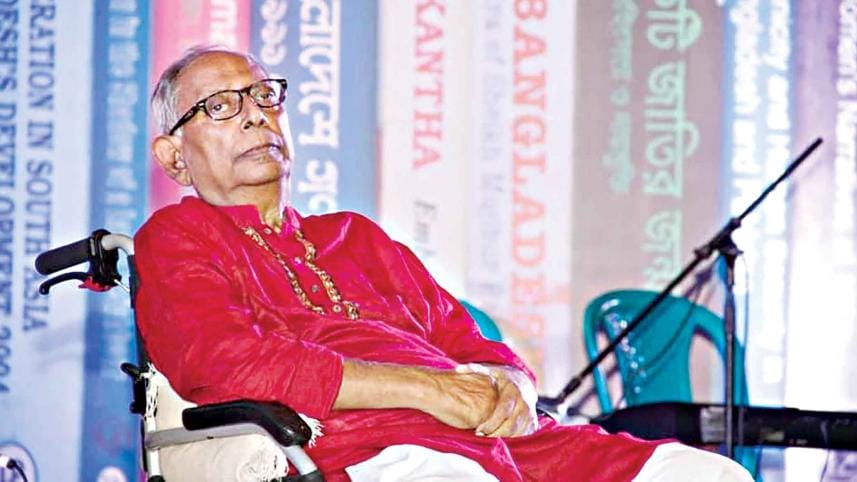Mohiuddin Ahmed: An institution in himself

To the average reader, Mohiuddin Ahmed is better known as the founder of University Press Limited, a reputed publishing house in the country. However, that describes only a part of his identity, an incomplete one. Limiting his identity to the founding of the UPL ignores his contributions to the world of publishing in Bangladesh and his impacts on Bangladesh studies. It is an understatement that Mohiuddin Ahmed was a pioneer in the publishing scene of Bangladesh, because he was much more than that.
The news of Mohiuddin Ahmed's passing is still hard to believe. He breathed his last early Tuesday, at the age of 77. He fought his long-term illness with remarkable courage and fortitude. Neither old age nor illness of one can prepare us for their departure. This is truer in the case of a personality like Mohiuddin Ahmed. His passing is an irreplaceable loss for us all.
The news of the demise of people who have, through their work, greatly changed an entire domain not only fills us with sorrow and pain but also reminds us, with greater clarity, how profoundly they impacted the lives of others. The absence of those whose endeavour has opened the door for the creative work and research of others reminds us of their importance in this world, and how badly we need them now and always.
To me, Mohiuddin Ahmed was a person dedicated to bringing the global standard of research, particularly in social sciences, at home. Throughout his life, he has tirelessly worked to introduce research works on Bangladesh, produced in Bangladesh, to the outside world—as well as to familiarise local readers with the research on Bangladesh being done internationally. The impact of his work can be grasped by looking at the books published by the UPL, the breadth of the topics covered, and how it has encouraged new researchers to engage in perceptive works. This is how he has enriched Bangladesh studies, both at home and abroad. For more than 40 years, that is what he has done wholeheartedly, without any respite. His driving forces were neither material success nor any expectation of recognition, but rather his love for his work and a profound sense of duty.
He was a soft-spoken person who preferred to remain behind the scenes. But the history of the publishing industry and its endeavour for quality—both in content and production—cannot be written without his name in it. He is the principal protagonist of the publishing history of the country and he will remain at the centre of it.
His talent and labour propelled him to this position. But above all, he has paved the way for his successors. Those associated with the publishing world in Bangladesh must acknowledge that the lion's share of the credit for Bangladesh's recognition in the international publishing industry belongs to him. That the books published in Bangladesh now draw the attention of the international community is largely because of his efforts and his attention to the quality of published content. This is where he is unique, and he has carved a space for himself.
His life began with journalism. He was invited to step into the academic world permanently when he was offered admission into a PhD programme at Stanford University. He previously taught in the journalism department of Punjab University in Pakistan. Therefore, it was not surprising that he had considered an academic trajectory. However, publishing and editing for the Oxford University Press (OUP) attracted him more. This happened in 1969, and became the turning point of his life.
When Mohiuddin Ahmed told me about this episode of his life in London in 1997/98, my spontaneous response was: "Thankfully, you joined the OUP instead of doing a PhD!" With his characteristic smile, he said, "I think so too." Then we talked more about how UPL was founded in 1975 and its journey in becoming the premier publishing house in Bangladesh. No wonder that under his leadership, UPL has won the National Book Centre Award a total of 16 times since 1981.
I often wondered, could anyone else have set the trend of publishing research-based English books in Bangladesh with such commitment? I think not.
The way he built the UPL and devoted himself to the world of publishing was only possible through patience, dedication, and love. In a country where such organisations do not have a history of surviving long, where their untimely demise is considered inevitable, Mohiuddin Ahmed built an institution that Bangladesh can be proud of. In the process of building this institution, he became an institution in himself.
Ali Riaz is a Distinguished Professor of Political Science at the Illinois State University, a non-resident Senior Fellow of the Atlantic Council, and the President of the American Institute of Bangladesh Studies (AIBS).




 For all latest news, follow The Daily Star's Google News channel.
For all latest news, follow The Daily Star's Google News channel.
Comments